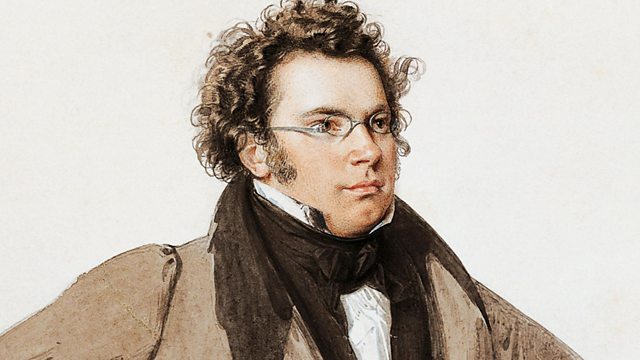
Posterity
Donald Macleod explores the life and music of Franz Schubert. Today, the posthumous discovery of much of Schubert's music, including many of his greatest works.
Donald Macleod explores the life and music of Franz Schubert. Today, the posthumous discovery of much of Schubert’s music, including many of his greatest works.
Otto Deutsch’s comprehensive catalogue of Schubert’s music records nearly 1,000 works, of which only around 200 (two-thirds of them songs) were published during the composer’s lifetime. So on Schubert’s death in November 1828, most of his output existed only in manuscript – the upshot being that for the moment, most of it remained unknown. Franz Liszt was an early promoter of Schubert’s music, creating a huge library of song-transcriptions and performing them in his concert tours around Europe and beyond. Schumann played an important role too, rediscovering the score of Schubert’s ‘Great’ C major Symphony in 1837 and prevailing on Mendelssohn to perform it with his Leipzig Gewandhaus Orchestra. Schubert’s C major String Quintet, widely regarded as one of the greatest masterpieces in the entire repertory of chamber music, languished in obscurity for another decade and more, when it was rescued for posterity by the violinist Joseph Hellmesberger, who led the first performance in 1850. The ‘Unfinished’ Symphony had to wait a further 15 years for its première, and even then, Schubert’s first biographer, Heinrich Kreissle von Hellborn, was still able to write of “vocal works of all kinds: cantatas; overtures; orchestral, opera and church music – of which until now, not a single note has ever been heard”. It was only with the publication of the final volume in Breitkopf and Härtel’s complete critical edition of Schubert’s works in 1897 – just in time for the centenary of the composer’s birth – that the full scope of his achievement was finally recognized.
Liszt, after Schubert
Die Rose – Lied von Franz Schubert, S556/1
Leslie Howard, piano
Symphony in C, D 944 (1st mvt, Andante – Allegro ma non troppo)
Philharmonia Orchestra
Charles Mackerras, conductor
Piano Sonata in A, D959 (2nd mvt, Andantino)
Krystian Zimerman, piano
String Quintet in C, D 956 (2nd mvt, Adagio)
Belcea Quartet
Valentin Erben, 2nd cello
Ständchen, D920
Sarah Walker, mezzo soprano
Alan Armstrong, Jason Balla, Mark Hammond, Philip Lawford, Arthur Linley, Richard Edgar-Wilson, tenor
David Barnard, David Beezer, Duncan Perkins, James Pitman, Christopher Vigar, bass
Graham Johnson, piano
Produced by Chris Barstow
Last on
More episodes
Next
You are at the last episode
Music Played
-
![]()
Franz Liszt
Die Rose
Performer: Leslie Howard.- HYPERION CDA66951/3.
- HYPERION.
- 4.
-
![]()
Franz Schubert
Symphony No. 9 in C Major D.944 1st Movement Andante Allegro ma non troppo
Orchestra: Philharmonia Orchestra. Conductor: Charles Mackerras.- SIGNUM SIGCD133.
- SIGNUM.
- 1.
-
![]()
Franz Schubert
Sonata In A Major D.959 2nd Movement Andantino
Performer: Krystian Zimerman.- DG 479 7588.
- DG.
- 2.
-
![]()
Franz Schubert
Quintet in C Major D.956 2nd Movement Adagio
Ensemble: Belcea Quartet.- EMI 9 67025 2.
- EMI.
- 2.
-
![]()
Franz Schubert
Standchen D.920
Performer: Graham Johnson. Singer: Sarah Walker. Singer: Alan Armstrong. Singer: Jason Balla. Singer: Mark Hammond. Singer: Philip Lawford. Singer: Arthur Linley. Singer: Richard Edgar‐Wilson. Singer: David Barnard. Singer: David Beezer. Singer: Duncan Perkins. Singer: James Pitman. Singer: Christopher Vigar.- HYPERION CDJ33008.
- HYPERION.
- 16.
Broadcast
- Fri 6 Sep 2019 12:00���˿��� Radio 3
Beethoven Unleashed – the box set
What was really wrong with Beethoven?
Composers A to Z
Who knew? Five eye-opening stories from Composer of the Week
Five reasons why we love Parry's Jerusalem
What is the strange power of Jerusalem which makes strong men weep?
A man out of time – why Parry's music and ideas were at odds with his image...
The composer of Jerusalem was very far from the conservative figure his image suggests.
Composer Help Page
Find resources and contacts for composers from within the classical music industry.





